Assessment 32471/02: Aged Care Support Worker Knowledge Test
VerifiedAdded on 2020/06/06
|18
|6088
|218
Homework Assignment
AI Summary
This assignment is a knowledge test designed for aged care support workers, focusing on the effects of dementia and effective care practices. It includes questions on communication strategies (verbal and non-verbal) to ensure effective interaction with individuals experiencing dementia, emphasizing a person-centered approach and support for individual preferences. The assessment requires students to identify and respond to changes in client behaviors, evaluate strategies to minimize the impact of these behaviors, and address self-care practices. The assignment also explores cultural sensitivity and the support needed for family members and carers. Students are prompted to analyze scenarios, provide detailed responses, and demonstrate their understanding of maintaining dignity, skills, and health within an aged care context. The assessment covers topics such as maintaining independence and dignity, financial concerns, and the importance of support networks.
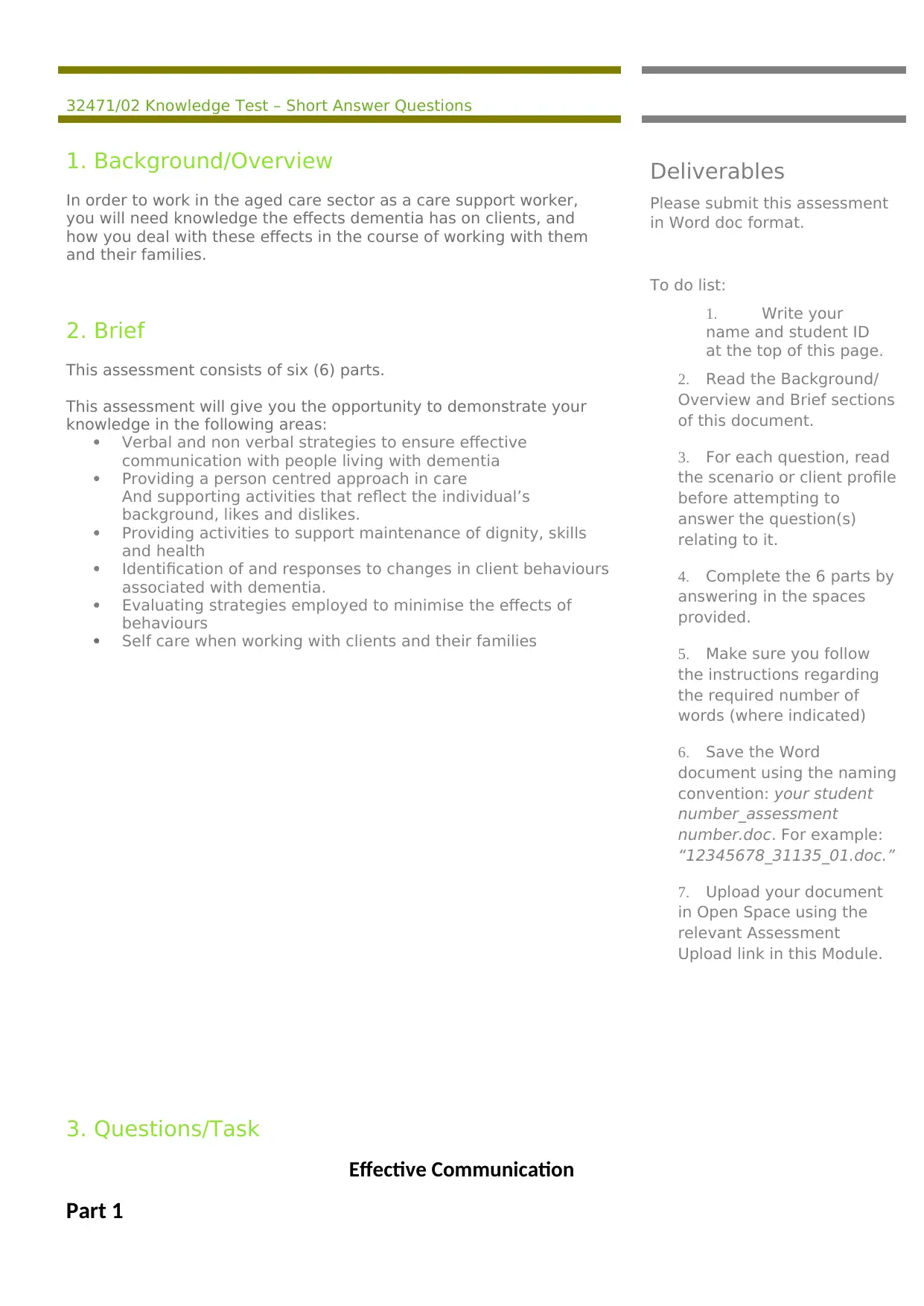
32471/02 Knowledge Test – Short Answer Questions
1. Background/Overview
In order to work in the aged care sector as a care support worker,
you will need knowledge the effects dementia has on clients, and
how you deal with these effects in the course of working with them
and their families.
2. Brief
This assessment consists of six (6) parts.
This assessment will give you the opportunity to demonstrate your
knowledge in the following areas:
Verbal and non verbal strategies to ensure effective
communication with people living with dementia
Providing a person centred approach in care
And supporting activities that reflect the individual’s
background, likes and dislikes.
Providing activities to support maintenance of dignity, skills
and health
Identification of and responses to changes in client behaviours
associated with dementia.
Evaluating strategies employed to minimise the effects of
behaviours
Self care when working with clients and their families
Deliverables
Please submit this assessment
in Word doc format.
To do list:
1. Write your
name and student ID
at the top of this page.
2. Read the Background/
Overview and Brief sections
of this document.
3. For each question, read
the scenario or client profile
before attempting to
answer the question(s)
relating to it.
4. Complete the 6 parts by
answering in the spaces
provided.
5. Make sure you follow
the instructions regarding
the required number of
words (where indicated)
6. Save the Word
document using the naming
convention: your student
number_assessment
number.doc. For example:
“12345678_31135_01.doc.”
7. Upload your document
in Open Space using the
relevant Assessment
Upload link in this Module.
3. Questions/Task
Effective Communication
Part 1
1. Background/Overview
In order to work in the aged care sector as a care support worker,
you will need knowledge the effects dementia has on clients, and
how you deal with these effects in the course of working with them
and their families.
2. Brief
This assessment consists of six (6) parts.
This assessment will give you the opportunity to demonstrate your
knowledge in the following areas:
Verbal and non verbal strategies to ensure effective
communication with people living with dementia
Providing a person centred approach in care
And supporting activities that reflect the individual’s
background, likes and dislikes.
Providing activities to support maintenance of dignity, skills
and health
Identification of and responses to changes in client behaviours
associated with dementia.
Evaluating strategies employed to minimise the effects of
behaviours
Self care when working with clients and their families
Deliverables
Please submit this assessment
in Word doc format.
To do list:
1. Write your
name and student ID
at the top of this page.
2. Read the Background/
Overview and Brief sections
of this document.
3. For each question, read
the scenario or client profile
before attempting to
answer the question(s)
relating to it.
4. Complete the 6 parts by
answering in the spaces
provided.
5. Make sure you follow
the instructions regarding
the required number of
words (where indicated)
6. Save the Word
document using the naming
convention: your student
number_assessment
number.doc. For example:
“12345678_31135_01.doc.”
7. Upload your document
in Open Space using the
relevant Assessment
Upload link in this Module.
3. Questions/Task
Effective Communication
Part 1
Paraphrase This Document
Need a fresh take? Get an instant paraphrase of this document with our AI Paraphraser
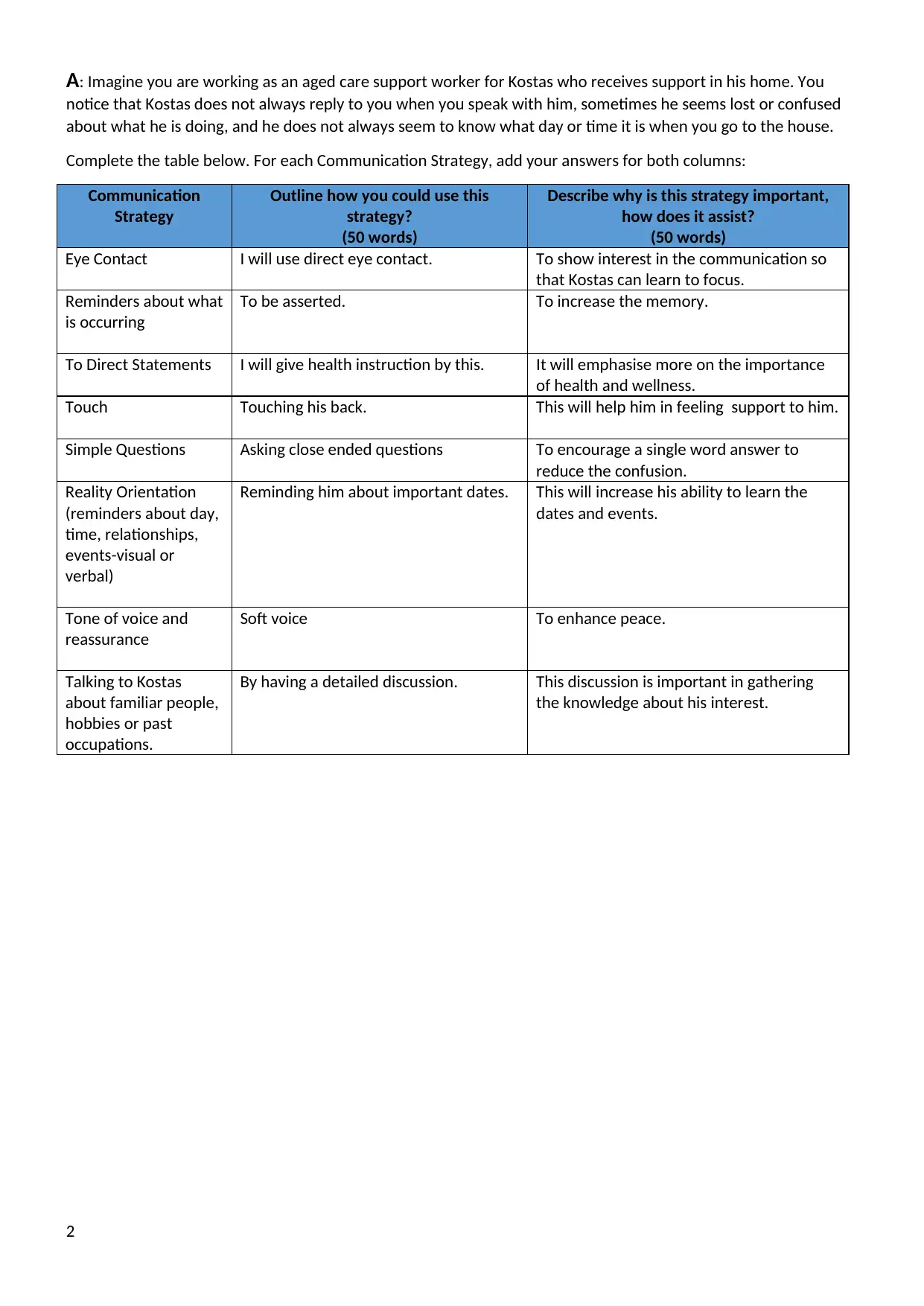
A: Imagine you are working as an aged care support worker for Kostas who receives support in his home. You
notice that Kostas does not always reply to you when you speak with him, sometimes he seems lost or confused
about what he is doing, and he does not always seem to know what day or time it is when you go to the house.
Complete the table below. For each Communication Strategy, add your answers for both columns:
Communication
Strategy
Outline how you could use this
strategy?
(50 words)
Describe why is this strategy important,
how does it assist?
(50 words)
Eye Contact I will use direct eye contact. To show interest in the communication so
that Kostas can learn to focus.
Reminders about what
is occurring
To be asserted. To increase the memory.
To Direct Statements I will give health instruction by this. It will emphasise more on the importance
of health and wellness.
Touch Touching his back. This will help him in feeling support to him.
Simple Questions Asking close ended questions To encourage a single word answer to
reduce the confusion.
Reality Orientation
(reminders about day,
time, relationships,
events-visual or
verbal)
Reminding him about important dates. This will increase his ability to learn the
dates and events.
Tone of voice and
reassurance
Soft voice To enhance peace.
Talking to Kostas
about familiar people,
hobbies or past
occupations.
By having a detailed discussion. This discussion is important in gathering
the knowledge about his interest.
2
notice that Kostas does not always reply to you when you speak with him, sometimes he seems lost or confused
about what he is doing, and he does not always seem to know what day or time it is when you go to the house.
Complete the table below. For each Communication Strategy, add your answers for both columns:
Communication
Strategy
Outline how you could use this
strategy?
(50 words)
Describe why is this strategy important,
how does it assist?
(50 words)
Eye Contact I will use direct eye contact. To show interest in the communication so
that Kostas can learn to focus.
Reminders about what
is occurring
To be asserted. To increase the memory.
To Direct Statements I will give health instruction by this. It will emphasise more on the importance
of health and wellness.
Touch Touching his back. This will help him in feeling support to him.
Simple Questions Asking close ended questions To encourage a single word answer to
reduce the confusion.
Reality Orientation
(reminders about day,
time, relationships,
events-visual or
verbal)
Reminding him about important dates. This will increase his ability to learn the
dates and events.
Tone of voice and
reassurance
Soft voice To enhance peace.
Talking to Kostas
about familiar people,
hobbies or past
occupations.
By having a detailed discussion. This discussion is important in gathering
the knowledge about his interest.
2
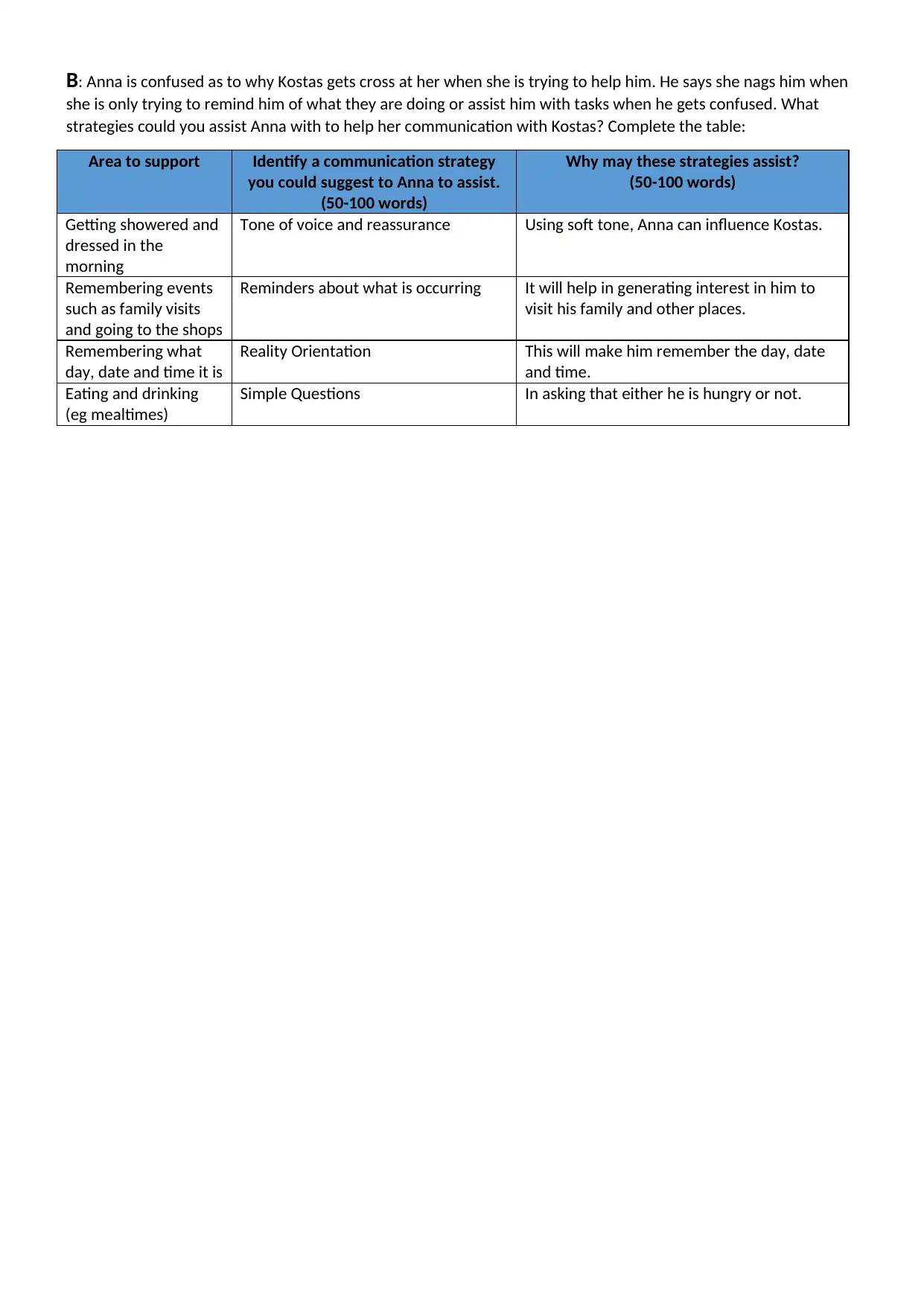
B: Anna is confused as to why Kostas gets cross at her when she is trying to help him. He says she nags him when
she is only trying to remind him of what they are doing or assist him with tasks when he gets confused. What
strategies could you assist Anna with to help her communication with Kostas? Complete the table:
Area to support Identify a communication strategy
you could suggest to Anna to assist.
(50-100 words)
Why may these strategies assist?
(50-100 words)
Getting showered and
dressed in the
morning
Tone of voice and reassurance Using soft tone, Anna can influence Kostas.
Remembering events
such as family visits
and going to the shops
Reminders about what is occurring It will help in generating interest in him to
visit his family and other places.
Remembering what
day, date and time it is
Reality Orientation This will make him remember the day, date
and time.
Eating and drinking
(eg mealtimes)
Simple Questions In asking that either he is hungry or not.
she is only trying to remind him of what they are doing or assist him with tasks when he gets confused. What
strategies could you assist Anna with to help her communication with Kostas? Complete the table:
Area to support Identify a communication strategy
you could suggest to Anna to assist.
(50-100 words)
Why may these strategies assist?
(50-100 words)
Getting showered and
dressed in the
morning
Tone of voice and reassurance Using soft tone, Anna can influence Kostas.
Remembering events
such as family visits
and going to the shops
Reminders about what is occurring It will help in generating interest in him to
visit his family and other places.
Remembering what
day, date and time it is
Reality Orientation This will make him remember the day, date
and time.
Eating and drinking
(eg mealtimes)
Simple Questions In asking that either he is hungry or not.
⊘ This is a preview!⊘
Do you want full access?
Subscribe today to unlock all pages.

Trusted by 1+ million students worldwide
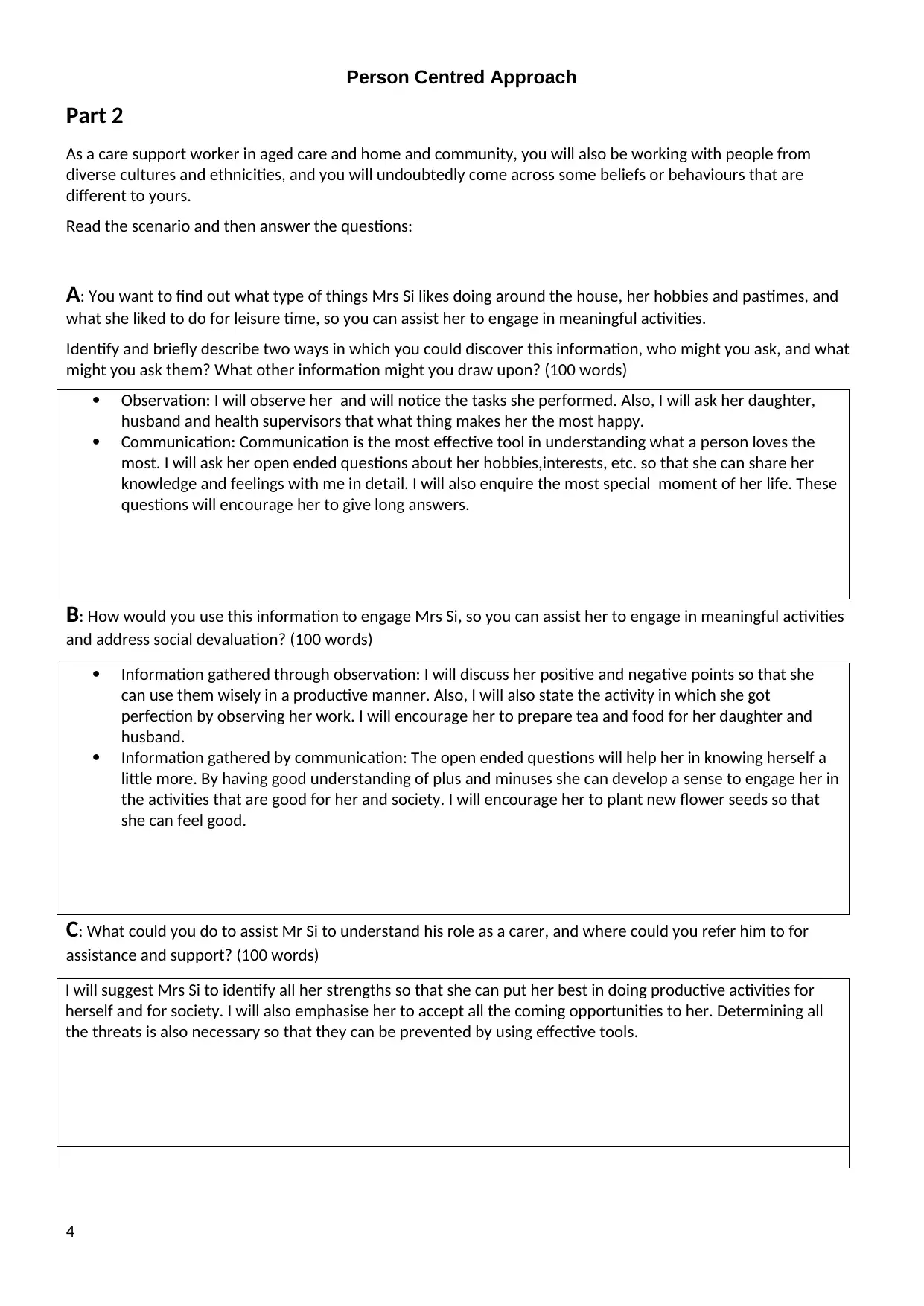
Person Centred Approach
Part 2
As a care support worker in aged care and home and community, you will also be working with people from
diverse cultures and ethnicities, and you will undoubtedly come across some beliefs or behaviours that are
different to yours.
Read the scenario and then answer the questions:
A: You want to find out what type of things Mrs Si likes doing around the house, her hobbies and pastimes, and
what she liked to do for leisure time, so you can assist her to engage in meaningful activities.
Identify and briefly describe two ways in which you could discover this information, who might you ask, and what
might you ask them? What other information might you draw upon? (100 words)
Observation: I will observe her and will notice the tasks she performed. Also, I will ask her daughter,
husband and health supervisors that what thing makes her the most happy.
Communication: Communication is the most effective tool in understanding what a person loves the
most. I will ask her open ended questions about her hobbies,interests, etc. so that she can share her
knowledge and feelings with me in detail. I will also enquire the most special moment of her life. These
questions will encourage her to give long answers.
B: How would you use this information to engage Mrs Si, so you can assist her to engage in meaningful activities
and address social devaluation? (100 words)
Information gathered through observation: I will discuss her positive and negative points so that she
can use them wisely in a productive manner. Also, I will also state the activity in which she got
perfection by observing her work. I will encourage her to prepare tea and food for her daughter and
husband.
Information gathered by communication: The open ended questions will help her in knowing herself a
little more. By having good understanding of plus and minuses she can develop a sense to engage her in
the activities that are good for her and society. I will encourage her to plant new flower seeds so that
she can feel good.
C: What could you do to assist Mr Si to understand his role as a carer, and where could you refer him to for
assistance and support? (100 words)
I will suggest Mrs Si to identify all her strengths so that she can put her best in doing productive activities for
herself and for society. I will also emphasise her to accept all the coming opportunities to her. Determining all
the threats is also necessary so that they can be prevented by using effective tools.
4
Part 2
As a care support worker in aged care and home and community, you will also be working with people from
diverse cultures and ethnicities, and you will undoubtedly come across some beliefs or behaviours that are
different to yours.
Read the scenario and then answer the questions:
A: You want to find out what type of things Mrs Si likes doing around the house, her hobbies and pastimes, and
what she liked to do for leisure time, so you can assist her to engage in meaningful activities.
Identify and briefly describe two ways in which you could discover this information, who might you ask, and what
might you ask them? What other information might you draw upon? (100 words)
Observation: I will observe her and will notice the tasks she performed. Also, I will ask her daughter,
husband and health supervisors that what thing makes her the most happy.
Communication: Communication is the most effective tool in understanding what a person loves the
most. I will ask her open ended questions about her hobbies,interests, etc. so that she can share her
knowledge and feelings with me in detail. I will also enquire the most special moment of her life. These
questions will encourage her to give long answers.
B: How would you use this information to engage Mrs Si, so you can assist her to engage in meaningful activities
and address social devaluation? (100 words)
Information gathered through observation: I will discuss her positive and negative points so that she
can use them wisely in a productive manner. Also, I will also state the activity in which she got
perfection by observing her work. I will encourage her to prepare tea and food for her daughter and
husband.
Information gathered by communication: The open ended questions will help her in knowing herself a
little more. By having good understanding of plus and minuses she can develop a sense to engage her in
the activities that are good for her and society. I will encourage her to plant new flower seeds so that
she can feel good.
C: What could you do to assist Mr Si to understand his role as a carer, and where could you refer him to for
assistance and support? (100 words)
I will suggest Mrs Si to identify all her strengths so that she can put her best in doing productive activities for
herself and for society. I will also emphasise her to accept all the coming opportunities to her. Determining all
the threats is also necessary so that they can be prevented by using effective tools.
4
Paraphrase This Document
Need a fresh take? Get an instant paraphrase of this document with our AI Paraphraser

Providing activities to support maintenance of dignity, skills and health
Part 3
As a care support worker in aged care and home and community, you may be called upon to provide care support
for younger people with dementia.
Read the scenario and then answer the questions:
Part 3
As a care support worker in aged care and home and community, you may be called upon to provide care support
for younger people with dementia.
Read the scenario and then answer the questions:
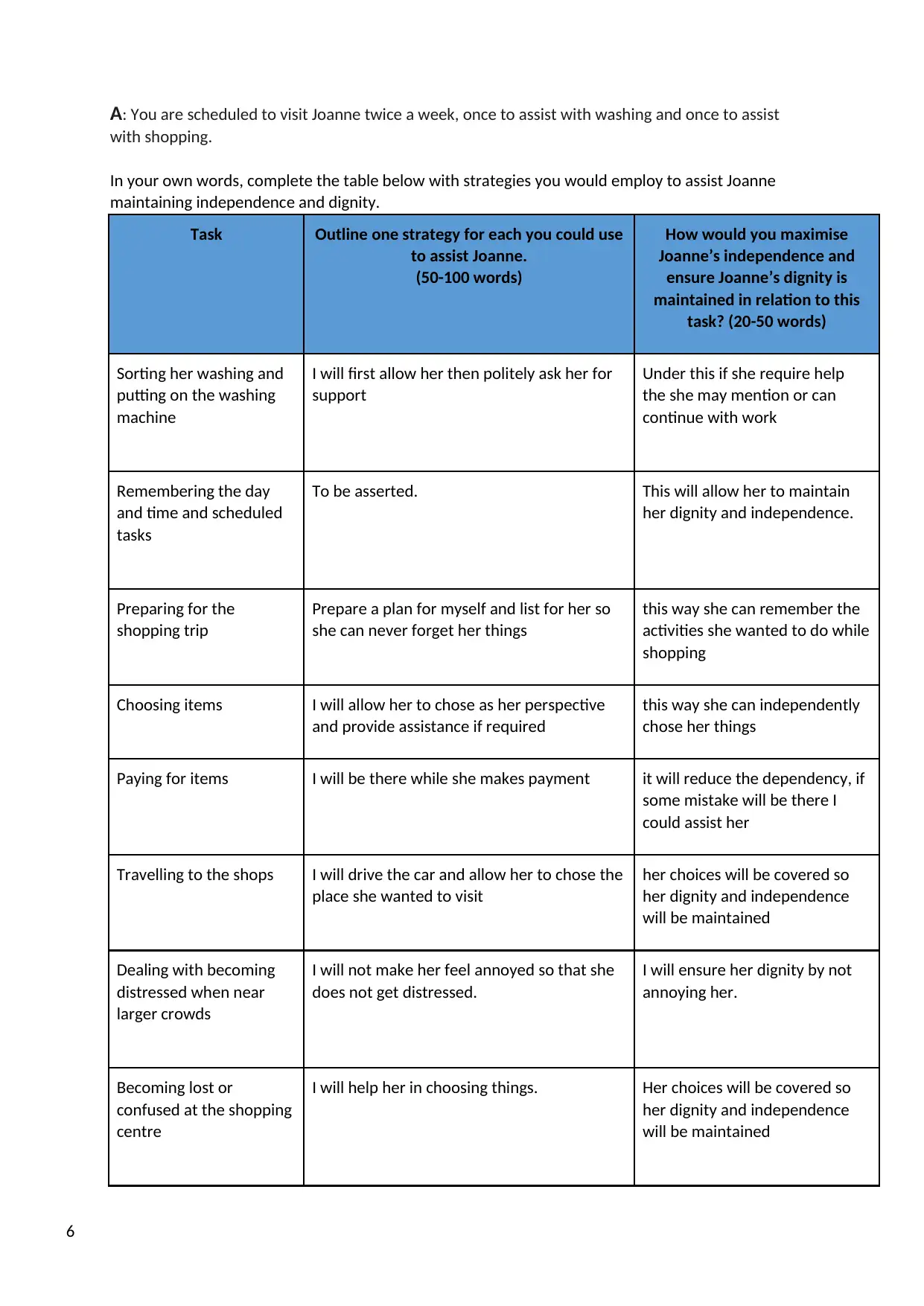
A: You are scheduled to visit Joanne twice a week, once to assist with washing and once to assist
with shopping.
In your own words, complete the table below with strategies you would employ to assist Joanne
maintaining independence and dignity.
Task Outline one strategy for each you could use
to assist Joanne.
(50-100 words)
How would you maximise
Joanne’s independence and
ensure Joanne’s dignity is
maintained in relation to this
task? (20-50 words)
Sorting her washing and
putting on the washing
machine
I will first allow her then politely ask her for
support
Under this if she require help
the she may mention or can
continue with work
Remembering the day
and time and scheduled
tasks
To be asserted. This will allow her to maintain
her dignity and independence.
Preparing for the
shopping trip
Prepare a plan for myself and list for her so
she can never forget her things
this way she can remember the
activities she wanted to do while
shopping
Choosing items I will allow her to chose as her perspective
and provide assistance if required
this way she can independently
chose her things
Paying for items I will be there while she makes payment it will reduce the dependency, if
some mistake will be there I
could assist her
Travelling to the shops I will drive the car and allow her to chose the
place she wanted to visit
her choices will be covered so
her dignity and independence
will be maintained
Dealing with becoming
distressed when near
larger crowds
I will not make her feel annoyed so that she
does not get distressed.
I will ensure her dignity by not
annoying her.
Becoming lost or
confused at the shopping
centre
I will help her in choosing things. Her choices will be covered so
her dignity and independence
will be maintained
6
with shopping.
In your own words, complete the table below with strategies you would employ to assist Joanne
maintaining independence and dignity.
Task Outline one strategy for each you could use
to assist Joanne.
(50-100 words)
How would you maximise
Joanne’s independence and
ensure Joanne’s dignity is
maintained in relation to this
task? (20-50 words)
Sorting her washing and
putting on the washing
machine
I will first allow her then politely ask her for
support
Under this if she require help
the she may mention or can
continue with work
Remembering the day
and time and scheduled
tasks
To be asserted. This will allow her to maintain
her dignity and independence.
Preparing for the
shopping trip
Prepare a plan for myself and list for her so
she can never forget her things
this way she can remember the
activities she wanted to do while
shopping
Choosing items I will allow her to chose as her perspective
and provide assistance if required
this way she can independently
chose her things
Paying for items I will be there while she makes payment it will reduce the dependency, if
some mistake will be there I
could assist her
Travelling to the shops I will drive the car and allow her to chose the
place she wanted to visit
her choices will be covered so
her dignity and independence
will be maintained
Dealing with becoming
distressed when near
larger crowds
I will not make her feel annoyed so that she
does not get distressed.
I will ensure her dignity by not
annoying her.
Becoming lost or
confused at the shopping
centre
I will help her in choosing things. Her choices will be covered so
her dignity and independence
will be maintained
6
⊘ This is a preview!⊘
Do you want full access?
Subscribe today to unlock all pages.

Trusted by 1+ million students worldwide
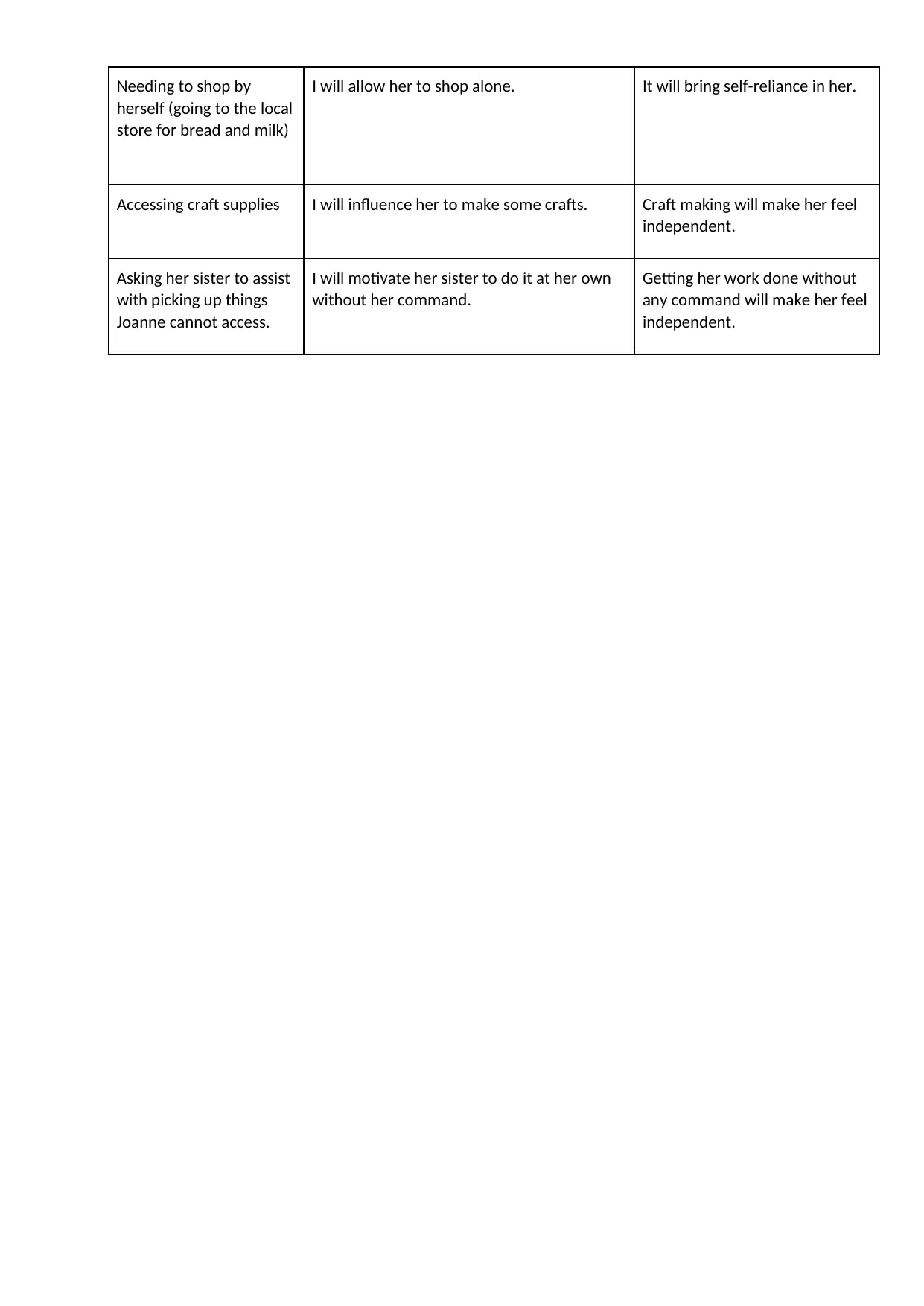
Needing to shop by
herself (going to the local
store for bread and milk)
I will allow her to shop alone. It will bring self-reliance in her.
Accessing craft supplies I will influence her to make some crafts. Craft making will make her feel
independent.
Asking her sister to assist
with picking up things
Joanne cannot access.
I will motivate her sister to do it at her own
without her command.
Getting her work done without
any command will make her feel
independent.
herself (going to the local
store for bread and milk)
I will allow her to shop alone. It will bring self-reliance in her.
Accessing craft supplies I will influence her to make some crafts. Craft making will make her feel
independent.
Asking her sister to assist
with picking up things
Joanne cannot access.
I will motivate her sister to do it at her own
without her command.
Getting her work done without
any command will make her feel
independent.
Paraphrase This Document
Need a fresh take? Get an instant paraphrase of this document with our AI Paraphraser

B: Joanne tells you on one of your trips to the shops that she is worried about her finances. She says that her
brother John comes around and takes money from her purse and she thinks that he knows her account PIN
number. She says that the rental agency wrote her a letter saying she is behind in her rent but she is confused
about this as it gets taken from her account automatically. Outline the steps you would take after Joanne tells you
this information. Explain why you would take these steps. (50-100 words)
I will suggest Joanne to change her PIN number and to not share it with anyone so that her brother can not
access her account. Besides this, I will say her to refuse the next time, John comes for money. In addition to
this, I will advice her to observe the activities of her brother so that she can identify where the money he is
spending at.
8
brother John comes around and takes money from her purse and she thinks that he knows her account PIN
number. She says that the rental agency wrote her a letter saying she is behind in her rent but she is confused
about this as it gets taken from her account automatically. Outline the steps you would take after Joanne tells you
this information. Explain why you would take these steps. (50-100 words)
I will suggest Joanne to change her PIN number and to not share it with anyone so that her brother can not
access her account. Besides this, I will say her to refuse the next time, John comes for money. In addition to
this, I will advice her to observe the activities of her brother so that she can identify where the money he is
spending at.
8
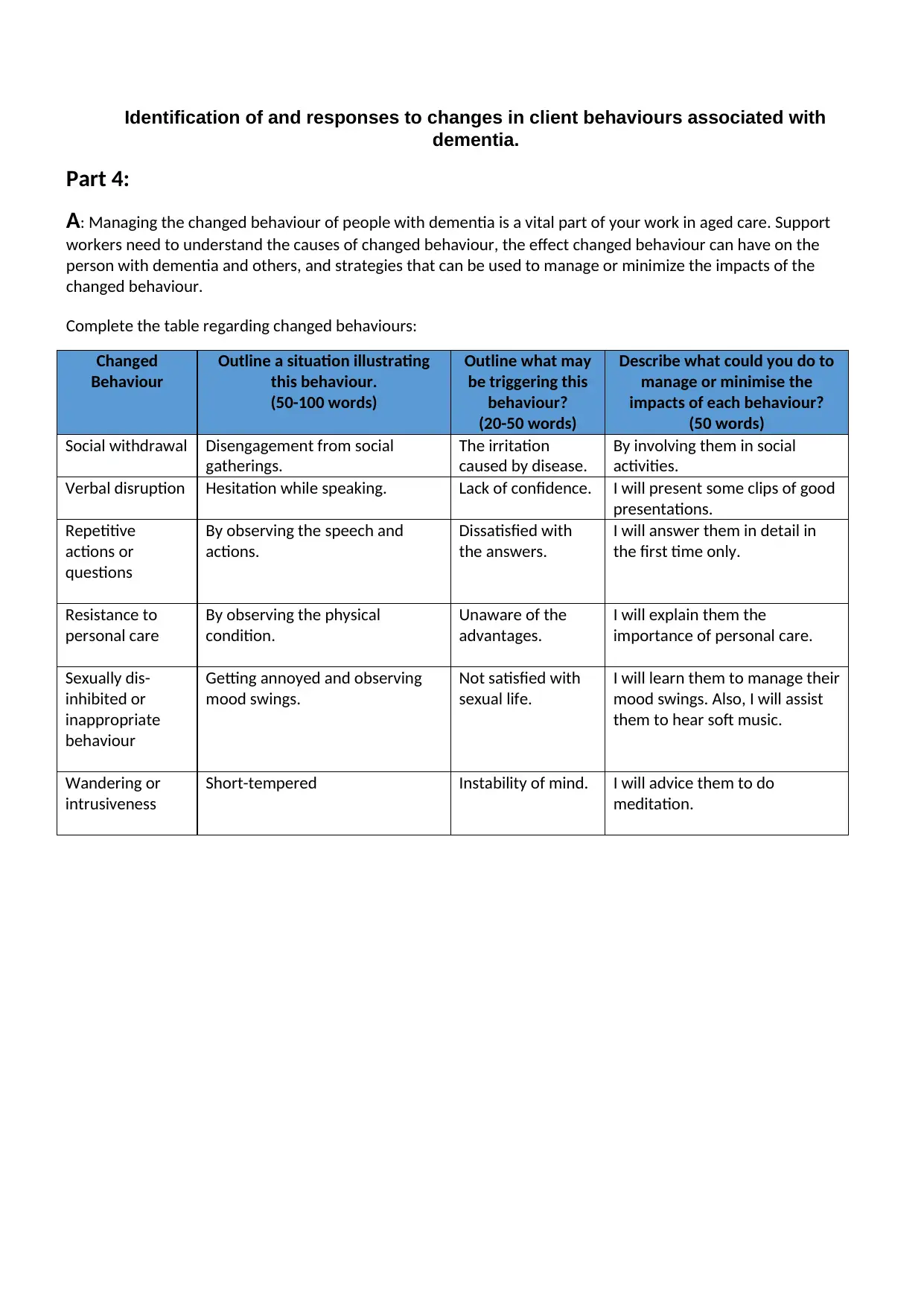
Identification of and responses to changes in client behaviours associated with
dementia.
Part 4:
A: Managing the changed behaviour of people with dementia is a vital part of your work in aged care. Support
workers need to understand the causes of changed behaviour, the effect changed behaviour can have on the
person with dementia and others, and strategies that can be used to manage or minimize the impacts of the
changed behaviour.
Complete the table regarding changed behaviours:
Changed
Behaviour
Outline a situation illustrating
this behaviour.
(50-100 words)
Outline what may
be triggering this
behaviour?
(20-50 words)
Describe what could you do to
manage or minimise the
impacts of each behaviour?
(50 words)
Social withdrawal Disengagement from social
gatherings.
The irritation
caused by disease.
By involving them in social
activities.
Verbal disruption Hesitation while speaking. Lack of confidence. I will present some clips of good
presentations.
Repetitive
actions or
questions
By observing the speech and
actions.
Dissatisfied with
the answers.
I will answer them in detail in
the first time only.
Resistance to
personal care
By observing the physical
condition.
Unaware of the
advantages.
I will explain them the
importance of personal care.
Sexually dis-
inhibited or
inappropriate
behaviour
Getting annoyed and observing
mood swings.
Not satisfied with
sexual life.
I will learn them to manage their
mood swings. Also, I will assist
them to hear soft music.
Wandering or
intrusiveness
Short-tempered Instability of mind. I will advice them to do
meditation.
dementia.
Part 4:
A: Managing the changed behaviour of people with dementia is a vital part of your work in aged care. Support
workers need to understand the causes of changed behaviour, the effect changed behaviour can have on the
person with dementia and others, and strategies that can be used to manage or minimize the impacts of the
changed behaviour.
Complete the table regarding changed behaviours:
Changed
Behaviour
Outline a situation illustrating
this behaviour.
(50-100 words)
Outline what may
be triggering this
behaviour?
(20-50 words)
Describe what could you do to
manage or minimise the
impacts of each behaviour?
(50 words)
Social withdrawal Disengagement from social
gatherings.
The irritation
caused by disease.
By involving them in social
activities.
Verbal disruption Hesitation while speaking. Lack of confidence. I will present some clips of good
presentations.
Repetitive
actions or
questions
By observing the speech and
actions.
Dissatisfied with
the answers.
I will answer them in detail in
the first time only.
Resistance to
personal care
By observing the physical
condition.
Unaware of the
advantages.
I will explain them the
importance of personal care.
Sexually dis-
inhibited or
inappropriate
behaviour
Getting annoyed and observing
mood swings.
Not satisfied with
sexual life.
I will learn them to manage their
mood swings. Also, I will assist
them to hear soft music.
Wandering or
intrusiveness
Short-tempered Instability of mind. I will advice them to do
meditation.
⊘ This is a preview!⊘
Do you want full access?
Subscribe today to unlock all pages.

Trusted by 1+ million students worldwide
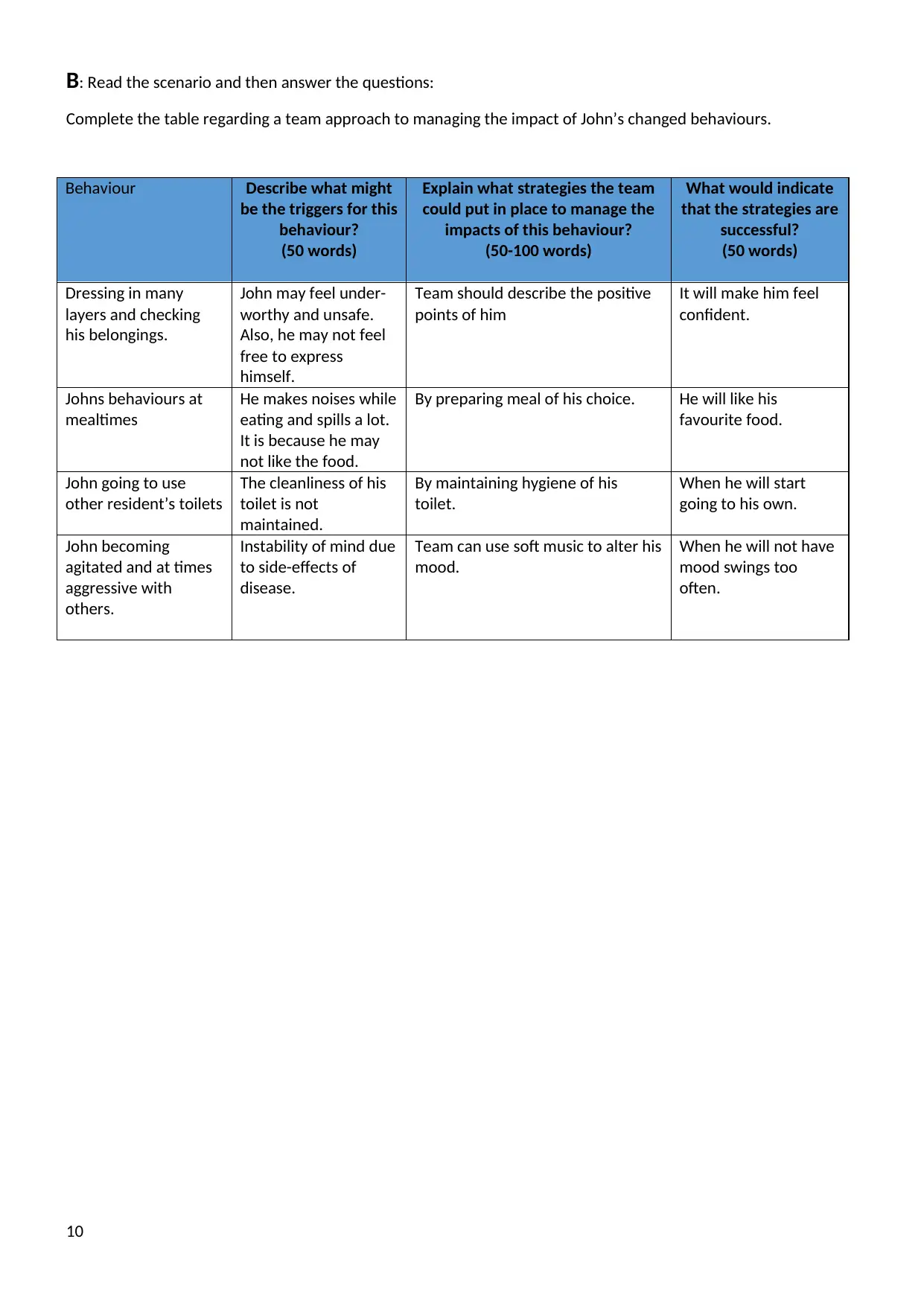
B: Read the scenario and then answer the questions:
Complete the table regarding a team approach to managing the impact of John’s changed behaviours.
Behaviour Describe what might
be the triggers for this
behaviour?
(50 words)
Explain what strategies the team
could put in place to manage the
impacts of this behaviour?
(50-100 words)
What would indicate
that the strategies are
successful?
(50 words)
Dressing in many
layers and checking
his belongings.
John may feel under-
worthy and unsafe.
Also, he may not feel
free to express
himself.
Team should describe the positive
points of him
It will make him feel
confident.
Johns behaviours at
mealtimes
He makes noises while
eating and spills a lot.
It is because he may
not like the food.
By preparing meal of his choice. He will like his
favourite food.
John going to use
other resident’s toilets
The cleanliness of his
toilet is not
maintained.
By maintaining hygiene of his
toilet.
When he will start
going to his own.
John becoming
agitated and at times
aggressive with
others.
Instability of mind due
to side-effects of
disease.
Team can use soft music to alter his
mood.
When he will not have
mood swings too
often.
10
Complete the table regarding a team approach to managing the impact of John’s changed behaviours.
Behaviour Describe what might
be the triggers for this
behaviour?
(50 words)
Explain what strategies the team
could put in place to manage the
impacts of this behaviour?
(50-100 words)
What would indicate
that the strategies are
successful?
(50 words)
Dressing in many
layers and checking
his belongings.
John may feel under-
worthy and unsafe.
Also, he may not feel
free to express
himself.
Team should describe the positive
points of him
It will make him feel
confident.
Johns behaviours at
mealtimes
He makes noises while
eating and spills a lot.
It is because he may
not like the food.
By preparing meal of his choice. He will like his
favourite food.
John going to use
other resident’s toilets
The cleanliness of his
toilet is not
maintained.
By maintaining hygiene of his
toilet.
When he will start
going to his own.
John becoming
agitated and at times
aggressive with
others.
Instability of mind due
to side-effects of
disease.
Team can use soft music to alter his
mood.
When he will not have
mood swings too
often.
10
Paraphrase This Document
Need a fresh take? Get an instant paraphrase of this document with our AI Paraphraser
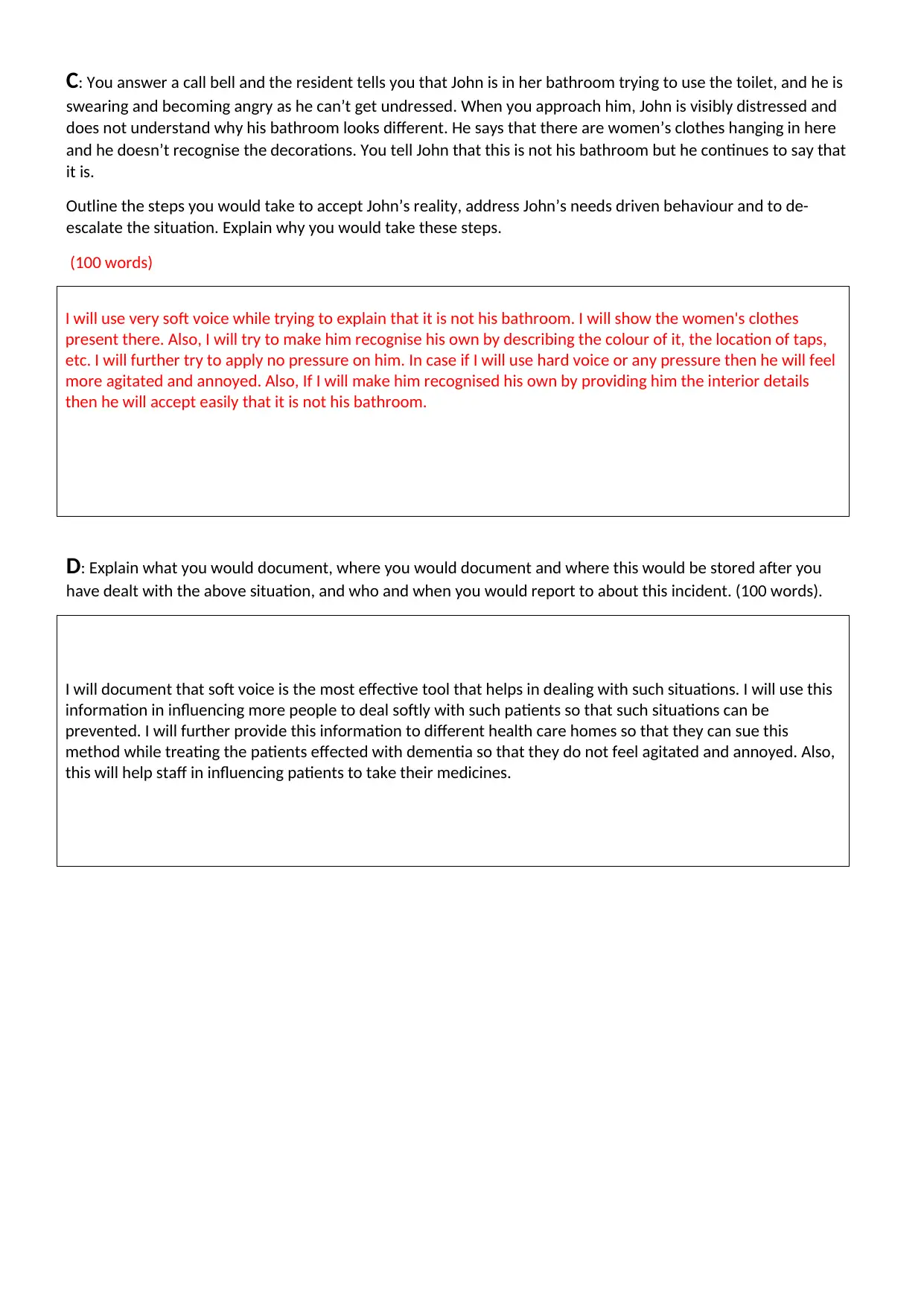
C: You answer a call bell and the resident tells you that John is in her bathroom trying to use the toilet, and he is
swearing and becoming angry as he can’t get undressed. When you approach him, John is visibly distressed and
does not understand why his bathroom looks different. He says that there are women’s clothes hanging in here
and he doesn’t recognise the decorations. You tell John that this is not his bathroom but he continues to say that
it is.
Outline the steps you would take to accept John’s reality, address John’s needs driven behaviour and to de-
escalate the situation. Explain why you would take these steps.
(100 words)
I will use very soft voice while trying to explain that it is not his bathroom. I will show the women's clothes
present there. Also, I will try to make him recognise his own by describing the colour of it, the location of taps,
etc. I will further try to apply no pressure on him. In case if I will use hard voice or any pressure then he will feel
more agitated and annoyed. Also, If I will make him recognised his own by providing him the interior details
then he will accept easily that it is not his bathroom.
D: Explain what you would document, where you would document and where this would be stored after you
have dealt with the above situation, and who and when you would report to about this incident. (100 words).
I will document that soft voice is the most effective tool that helps in dealing with such situations. I will use this
information in influencing more people to deal softly with such patients so that such situations can be
prevented. I will further provide this information to different health care homes so that they can sue this
method while treating the patients effected with dementia so that they do not feel agitated and annoyed. Also,
this will help staff in influencing patients to take their medicines.
swearing and becoming angry as he can’t get undressed. When you approach him, John is visibly distressed and
does not understand why his bathroom looks different. He says that there are women’s clothes hanging in here
and he doesn’t recognise the decorations. You tell John that this is not his bathroom but he continues to say that
it is.
Outline the steps you would take to accept John’s reality, address John’s needs driven behaviour and to de-
escalate the situation. Explain why you would take these steps.
(100 words)
I will use very soft voice while trying to explain that it is not his bathroom. I will show the women's clothes
present there. Also, I will try to make him recognise his own by describing the colour of it, the location of taps,
etc. I will further try to apply no pressure on him. In case if I will use hard voice or any pressure then he will feel
more agitated and annoyed. Also, If I will make him recognised his own by providing him the interior details
then he will accept easily that it is not his bathroom.
D: Explain what you would document, where you would document and where this would be stored after you
have dealt with the above situation, and who and when you would report to about this incident. (100 words).
I will document that soft voice is the most effective tool that helps in dealing with such situations. I will use this
information in influencing more people to deal softly with such patients so that such situations can be
prevented. I will further provide this information to different health care homes so that they can sue this
method while treating the patients effected with dementia so that they do not feel agitated and annoyed. Also,
this will help staff in influencing patients to take their medicines.
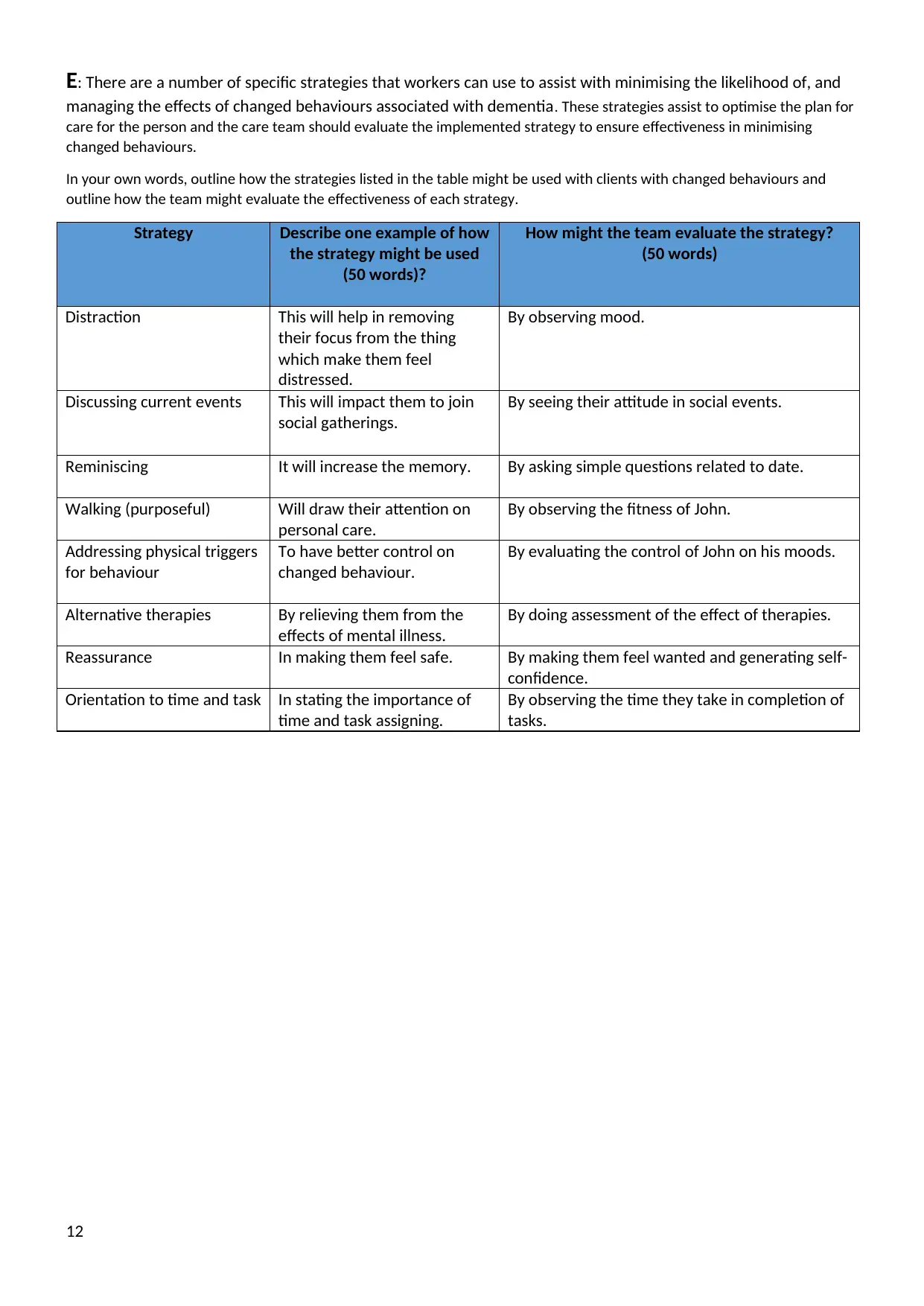
E: There are a number of specific strategies that workers can use to assist with minimising the likelihood of, and
managing the effects of changed behaviours associated with dementia. These strategies assist to optimise the plan for
care for the person and the care team should evaluate the implemented strategy to ensure effectiveness in minimising
changed behaviours.
In your own words, outline how the strategies listed in the table might be used with clients with changed behaviours and
outline how the team might evaluate the effectiveness of each strategy.
Strategy Describe one example of how
the strategy might be used
(50 words)?
How might the team evaluate the strategy?
(50 words)
Distraction This will help in removing
their focus from the thing
which make them feel
distressed.
By observing mood.
Discussing current events This will impact them to join
social gatherings.
By seeing their attitude in social events.
Reminiscing It will increase the memory. By asking simple questions related to date.
Walking (purposeful) Will draw their attention on
personal care.
By observing the fitness of John.
Addressing physical triggers
for behaviour
To have better control on
changed behaviour.
By evaluating the control of John on his moods.
Alternative therapies By relieving them from the
effects of mental illness.
By doing assessment of the effect of therapies.
Reassurance In making them feel safe. By making them feel wanted and generating self-
confidence.
Orientation to time and task In stating the importance of
time and task assigning.
By observing the time they take in completion of
tasks.
12
managing the effects of changed behaviours associated with dementia. These strategies assist to optimise the plan for
care for the person and the care team should evaluate the implemented strategy to ensure effectiveness in minimising
changed behaviours.
In your own words, outline how the strategies listed in the table might be used with clients with changed behaviours and
outline how the team might evaluate the effectiveness of each strategy.
Strategy Describe one example of how
the strategy might be used
(50 words)?
How might the team evaluate the strategy?
(50 words)
Distraction This will help in removing
their focus from the thing
which make them feel
distressed.
By observing mood.
Discussing current events This will impact them to join
social gatherings.
By seeing their attitude in social events.
Reminiscing It will increase the memory. By asking simple questions related to date.
Walking (purposeful) Will draw their attention on
personal care.
By observing the fitness of John.
Addressing physical triggers
for behaviour
To have better control on
changed behaviour.
By evaluating the control of John on his moods.
Alternative therapies By relieving them from the
effects of mental illness.
By doing assessment of the effect of therapies.
Reassurance In making them feel safe. By making them feel wanted and generating self-
confidence.
Orientation to time and task In stating the importance of
time and task assigning.
By observing the time they take in completion of
tasks.
12
⊘ This is a preview!⊘
Do you want full access?
Subscribe today to unlock all pages.

Trusted by 1+ million students worldwide
1 out of 18
Related Documents
Your All-in-One AI-Powered Toolkit for Academic Success.
+13062052269
info@desklib.com
Available 24*7 on WhatsApp / Email
![[object Object]](/_next/static/media/star-bottom.7253800d.svg)
Unlock your academic potential
Copyright © 2020–2025 A2Z Services. All Rights Reserved. Developed and managed by ZUCOL.





